外研版(2019)必修 第一册Unit 4 Friends forever Listening and speaking课件 (共27张PPT)
文档属性
| 名称 | 外研版(2019)必修 第一册Unit 4 Friends forever Listening and speaking课件 (共27张PPT) | 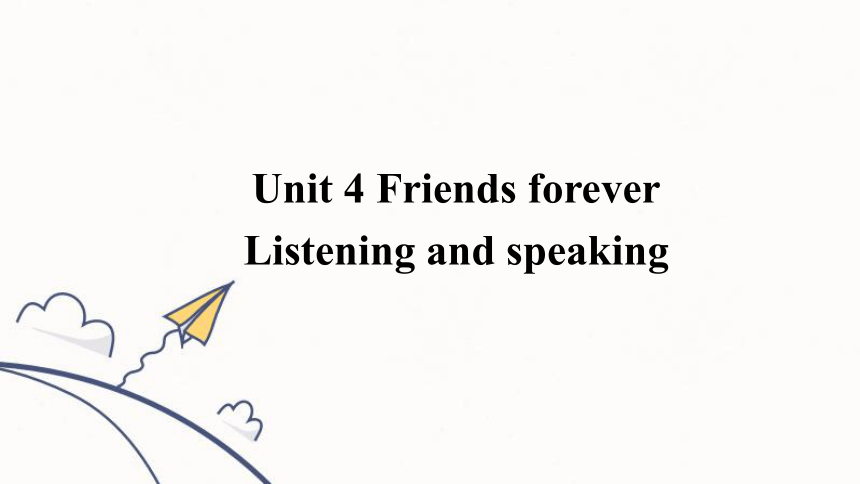 | |
| 格式 | pptx | ||
| 文件大小 | 7.3MB | ||
| 资源类型 | 教案 | ||
| 版本资源 | 外研版(2019) | ||
| 科目 | 英语 | ||
| 更新时间 | 2024-10-19 15:25:29 | ||
图片预览

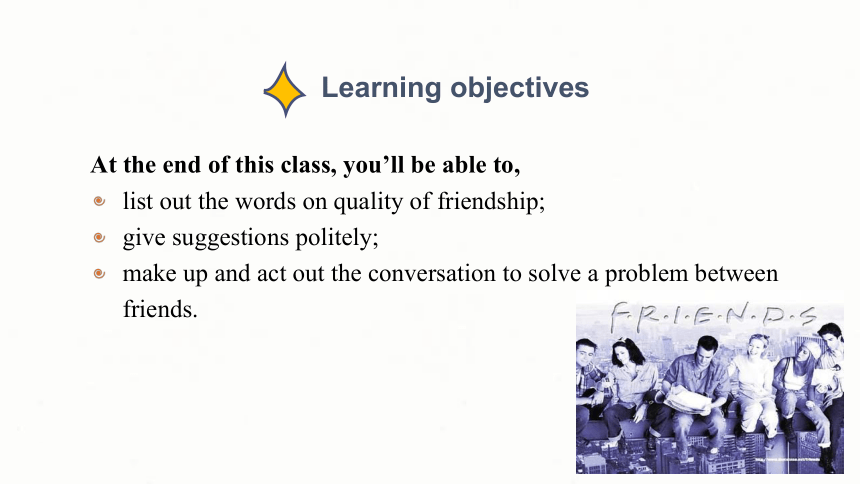

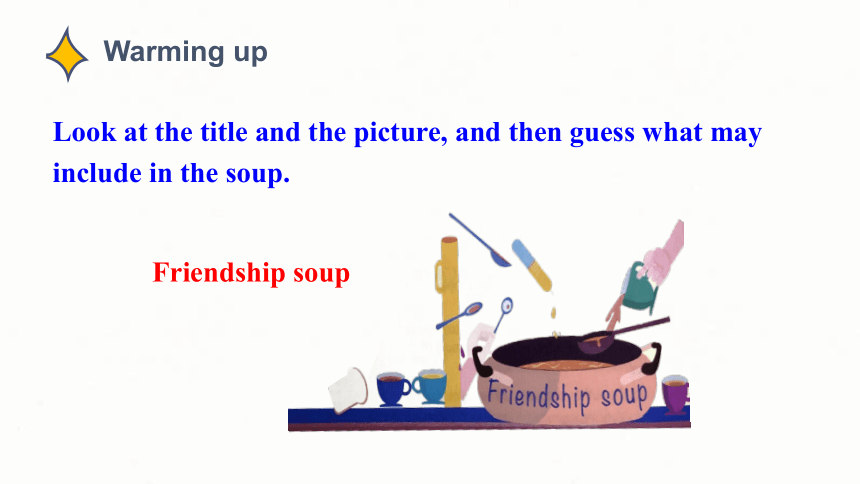
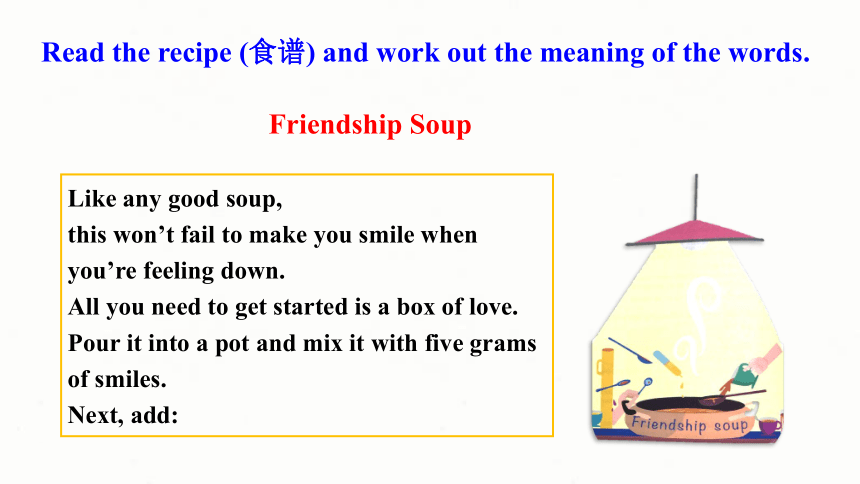
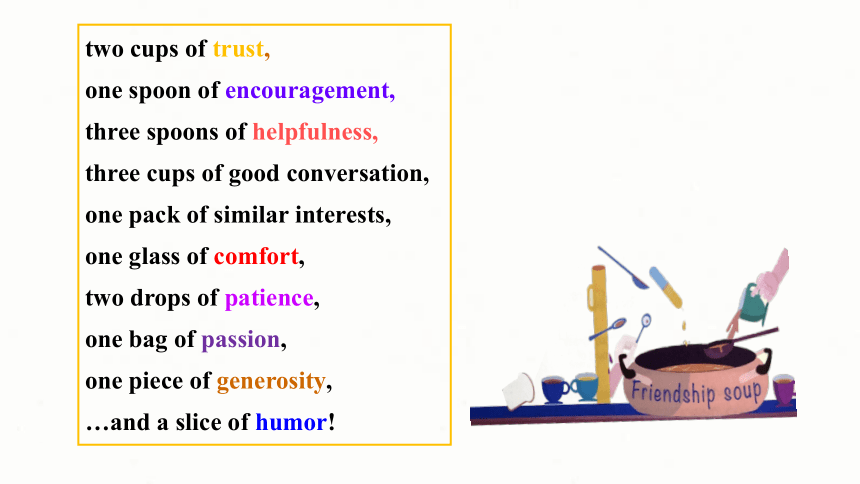
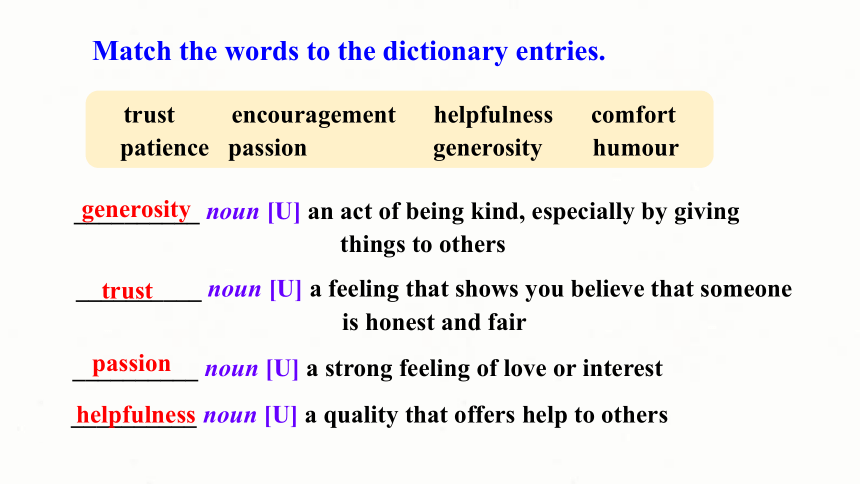
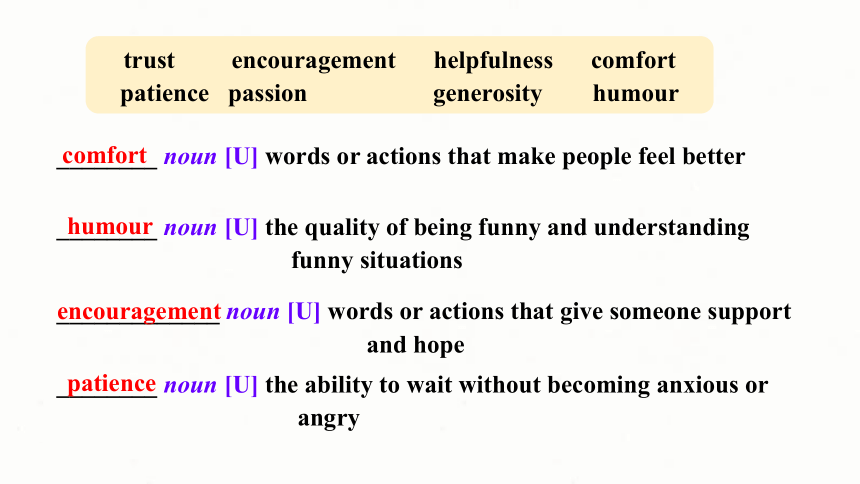
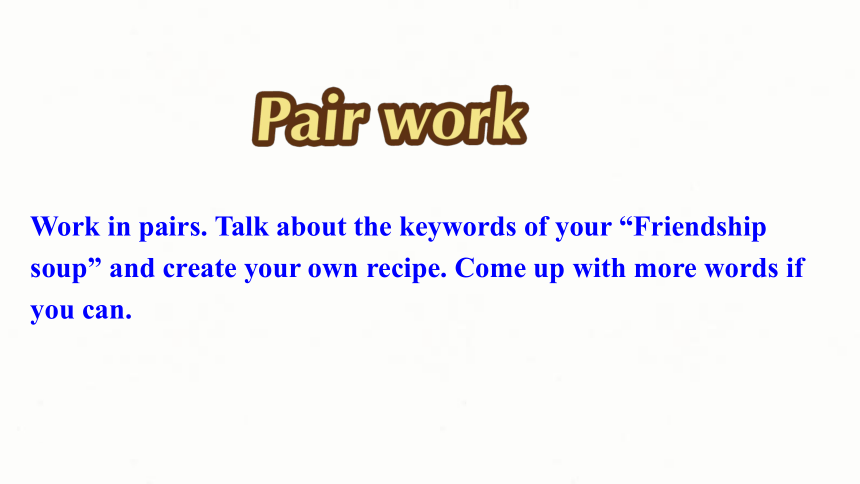
文档简介
(共27张PPT)
Unit 4 Friends forever
Listening and speaking
At the end of this class, you’ll be able to,
list out the words on quality of friendship;
give suggestions politely;
make up and act out the conversation to solve a problem between friends.
Learning objectives
Keywords of friendship
Look at the title and the picture, and then guess what may include in the soup.
Friendship soup
Warming up
Read the recipe (食谱) and work out the meaning of the words.
Friendship Soup
Like any good soup,
this won’t fail to make you smile when you’re feeling down.
All you need to get started is a box of love.
Pour it into a pot and mix it with five grams of smiles.
Next, add:
two cups of trust,
one spoon of encouragement,
three spoons of helpfulness,
three cups of good conversation,
one pack of similar interests,
one glass of comfort,
two drops of patience,
one bag of passion,
one piece of generosity,
…and a slice of humor!
Match the words to the dictionary entries.
__________ noun [U] an act of being kind, especially by giving things to others
trust encouragement helpfulness comfort patience passion generosity humour
__________ noun [U] a feeling that shows you believe that someone is honest and fair
__________ noun [U] a strong feeling of love or interest
generosity
trust
passion
__________ noun [U] a quality that offers help to others
helpfulness
________ noun [U] words or actions that make people feel better
________ noun [U] the quality of being funny and understanding funny situations
_____________ noun [U] words or actions that give someone support and hope
________ noun [U] the ability to wait without becoming anxious or angry
comfort
humour
encouragement
patience
trust encouragement helpfulness comfort patience passion generosity humour
Work in pairs. Talk about the keywords of your “Friendship soup” and create your own e up with more words if you can.
ability 能力,ambition 抱负,attraction 爱慕,
bravery 勇敢的行为,carefulness 细心,confidence 信心,cooperation 协作, creativity 创造力,dedication 奉献,diligence 勤勉,discipline 纪律,duty 责任,energy 活力,enterprise 进取心, frankness 直率,independence 独立,intelligence 智慧,kindness 好意,logic 逻辑,
modesty 谦逊,objectiveness 客观,optimism 乐观,perseverance 坚持不懈,politeness 礼貌,punctuality 守时,responsibility 责任,selflessness 无私,support 支持,
sincerity 真诚,steadiness 踏实,tirelessness 孜孜不倦
Helping our friends
The word “friend” comes from the Old English “freond ”, meaning “the loved one”.
According to a study from Yale University and the University of California at San Diego in 2014, good friends are often genetically similar. In fact, good friends can share up to 1% of the same genes — as much as we might share with our great-great-great grandparents!
Listen to the conversation and number the events in the correct order.
Andy and Clara thought about postponing their trip.
Matt broke his leg.
Andy and Clara agreed on a plan.
Matt called Clara.
Andy, Clara and Matt decided to go to London.
Andy and Clara made a cardboard version of Matt.
4
5
3
1
2
6
Listen again and complete the table.
Suggestion Comment
We could send him 1. __________ of the places we visit. That might make him 2. ________________.
How about sending him 3. ________________ from every place we visit They may 4. __________ to arrive.
photos
feel even worse
funny postcards
take days
Suggestion Comment
How about having a(n) 5. ____________ with him at different places They aren’t 6. _________ in some places.
We can print Matt’s photo on a 7.___________ cardboard cutout and take photos with it everywhere we go. It will feel like he’s there with us and Matt will
8. ________ at the photos.
video chat
allowed
life-sized
laugh
Listen again and pay attention to the expressions of giving suggestions.
Andy: Hello!
Clara: Hi, Andy! This is Clara. Matt just called me. He said he broke his leg and couldn’t make our trip to London this week.
Andy: What a shame! He’s been looking forward to it for ages.
Why don’t we wait until he’s better
Clara: He said we should go without him. It will take quite a while for him to get well again. He doesn’t want us to give up our holiday because of him.
Andy: But Matt is our friend. He needs our comfort and support. Let’s think about ways to cheer him up!
Clara: You’re right! We could send him photos of the places we visit.
Andy: We could, but that might make him feel even worse. I want to make him laugh.
Clara: How about sending him funny postcards from every place we visit
Andy: Maybe, but postcards can take days to arrive. How about having a video chat with him wherever we go That way he can see everything, too.
Clara: That’s a good idea. But you aren’t allowed to take videos in some places. OK, I’ve got it --- why don’t we take Matt with us
Andy: What about his broken leg
Clara: Not the real Matt. Let’s make a “Flat Matt”!
Andy: What !
Clara: We can print Matt’s photo on a life-sized cardboard cutout. We’ll then take it with us and whenever we take photos in London …
Andy: [interrupts] Matt will be in the photos, too, as if he were there with us.
Clara: That's right! “Flat Matt” will go to London with us, and the real Matt will laugh at the photos.
Andy: OK, Clara. Let's do it!
Matt still needs a while to get well.
You must finish the cardboard cutout before the trip.
How about sending Matt's picture to Taobao because they are more professional
suggestion
statement
order
Exploring: distinguish suggestion, statement and order.
Exploring: What are the speakers doing
A. Offering suggestions
B. Making comments
C. Presenting statements
D. Giving orders
When you make a suggestion, use less direct language than you would to make a statement or give an order. This makes it clear to the other person that you are giving them a choice. For example, you can begin with expressions such as Why don’t we… How about… Or use a past tense to distance yourself from the suggestion: I was wondering whether…
Act out the conversation between Andy and Clara with the help of the content in the table.
Can you work out other ways to help Matt Make a suggestion with the expressions we learnt.
Work in pairs. Act out the conversation to solve a problem between friends.
Student A
One of your friends has been avoiding you all week. He / She doesn’t talk to you and refuses to text or phone you back. Ask Student B for suggestions and give comments on them.
Useful expressions
Can you help me with …
I’d like your advice about …
What can I do to …
Do you think I should …
Maybe, but …
That might work.
Student B
Student A has a problem and needs your help. Find out what the problem is and give him / her some suggestions as to how to solve it.
Useful expressions
You should …
How about …
Perhaps you could …
It might be a good / bad idea to …
Why don’t you …
Let it all out.
Talk to someone about it.
Do something for yourself.
Don't be mean.
Don't fight.
Get a distance.
Make up.
Move on.
How to Handle Friend Problems
View things from the other person’s point of view.
Take a break.
和你一起耍
为你挺身而出
Tell a story of how you handled a friend problem
Homework
Unit 4 Friends forever
Listening and speaking
At the end of this class, you’ll be able to,
list out the words on quality of friendship;
give suggestions politely;
make up and act out the conversation to solve a problem between friends.
Learning objectives
Keywords of friendship
Look at the title and the picture, and then guess what may include in the soup.
Friendship soup
Warming up
Read the recipe (食谱) and work out the meaning of the words.
Friendship Soup
Like any good soup,
this won’t fail to make you smile when you’re feeling down.
All you need to get started is a box of love.
Pour it into a pot and mix it with five grams of smiles.
Next, add:
two cups of trust,
one spoon of encouragement,
three spoons of helpfulness,
three cups of good conversation,
one pack of similar interests,
one glass of comfort,
two drops of patience,
one bag of passion,
one piece of generosity,
…and a slice of humor!
Match the words to the dictionary entries.
__________ noun [U] an act of being kind, especially by giving things to others
trust encouragement helpfulness comfort patience passion generosity humour
__________ noun [U] a feeling that shows you believe that someone is honest and fair
__________ noun [U] a strong feeling of love or interest
generosity
trust
passion
__________ noun [U] a quality that offers help to others
helpfulness
________ noun [U] words or actions that make people feel better
________ noun [U] the quality of being funny and understanding funny situations
_____________ noun [U] words or actions that give someone support and hope
________ noun [U] the ability to wait without becoming anxious or angry
comfort
humour
encouragement
patience
trust encouragement helpfulness comfort patience passion generosity humour
Work in pairs. Talk about the keywords of your “Friendship soup” and create your own e up with more words if you can.
ability 能力,ambition 抱负,attraction 爱慕,
bravery 勇敢的行为,carefulness 细心,confidence 信心,cooperation 协作, creativity 创造力,dedication 奉献,diligence 勤勉,discipline 纪律,duty 责任,energy 活力,enterprise 进取心, frankness 直率,independence 独立,intelligence 智慧,kindness 好意,logic 逻辑,
modesty 谦逊,objectiveness 客观,optimism 乐观,perseverance 坚持不懈,politeness 礼貌,punctuality 守时,responsibility 责任,selflessness 无私,support 支持,
sincerity 真诚,steadiness 踏实,tirelessness 孜孜不倦
Helping our friends
The word “friend” comes from the Old English “freond ”, meaning “the loved one”.
According to a study from Yale University and the University of California at San Diego in 2014, good friends are often genetically similar. In fact, good friends can share up to 1% of the same genes — as much as we might share with our great-great-great grandparents!
Listen to the conversation and number the events in the correct order.
Andy and Clara thought about postponing their trip.
Matt broke his leg.
Andy and Clara agreed on a plan.
Matt called Clara.
Andy, Clara and Matt decided to go to London.
Andy and Clara made a cardboard version of Matt.
4
5
3
1
2
6
Listen again and complete the table.
Suggestion Comment
We could send him 1. __________ of the places we visit. That might make him 2. ________________.
How about sending him 3. ________________ from every place we visit They may 4. __________ to arrive.
photos
feel even worse
funny postcards
take days
Suggestion Comment
How about having a(n) 5. ____________ with him at different places They aren’t 6. _________ in some places.
We can print Matt’s photo on a 7.___________ cardboard cutout and take photos with it everywhere we go. It will feel like he’s there with us and Matt will
8. ________ at the photos.
video chat
allowed
life-sized
laugh
Listen again and pay attention to the expressions of giving suggestions.
Andy: Hello!
Clara: Hi, Andy! This is Clara. Matt just called me. He said he broke his leg and couldn’t make our trip to London this week.
Andy: What a shame! He’s been looking forward to it for ages.
Why don’t we wait until he’s better
Clara: He said we should go without him. It will take quite a while for him to get well again. He doesn’t want us to give up our holiday because of him.
Andy: But Matt is our friend. He needs our comfort and support. Let’s think about ways to cheer him up!
Clara: You’re right! We could send him photos of the places we visit.
Andy: We could, but that might make him feel even worse. I want to make him laugh.
Clara: How about sending him funny postcards from every place we visit
Andy: Maybe, but postcards can take days to arrive. How about having a video chat with him wherever we go That way he can see everything, too.
Clara: That’s a good idea. But you aren’t allowed to take videos in some places. OK, I’ve got it --- why don’t we take Matt with us
Andy: What about his broken leg
Clara: Not the real Matt. Let’s make a “Flat Matt”!
Andy: What !
Clara: We can print Matt’s photo on a life-sized cardboard cutout. We’ll then take it with us and whenever we take photos in London …
Andy: [interrupts] Matt will be in the photos, too, as if he were there with us.
Clara: That's right! “Flat Matt” will go to London with us, and the real Matt will laugh at the photos.
Andy: OK, Clara. Let's do it!
Matt still needs a while to get well.
You must finish the cardboard cutout before the trip.
How about sending Matt's picture to Taobao because they are more professional
suggestion
statement
order
Exploring: distinguish suggestion, statement and order.
Exploring: What are the speakers doing
A. Offering suggestions
B. Making comments
C. Presenting statements
D. Giving orders
When you make a suggestion, use less direct language than you would to make a statement or give an order. This makes it clear to the other person that you are giving them a choice. For example, you can begin with expressions such as Why don’t we… How about… Or use a past tense to distance yourself from the suggestion: I was wondering whether…
Act out the conversation between Andy and Clara with the help of the content in the table.
Can you work out other ways to help Matt Make a suggestion with the expressions we learnt.
Work in pairs. Act out the conversation to solve a problem between friends.
Student A
One of your friends has been avoiding you all week. He / She doesn’t talk to you and refuses to text or phone you back. Ask Student B for suggestions and give comments on them.
Useful expressions
Can you help me with …
I’d like your advice about …
What can I do to …
Do you think I should …
Maybe, but …
That might work.
Student B
Student A has a problem and needs your help. Find out what the problem is and give him / her some suggestions as to how to solve it.
Useful expressions
You should …
How about …
Perhaps you could …
It might be a good / bad idea to …
Why don’t you …
Let it all out.
Talk to someone about it.
Do something for yourself.
Don't be mean.
Don't fight.
Get a distance.
Make up.
Move on.
How to Handle Friend Problems
View things from the other person’s point of view.
Take a break.
和你一起耍
为你挺身而出
Tell a story of how you handled a friend problem
Homework
